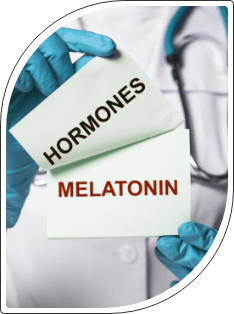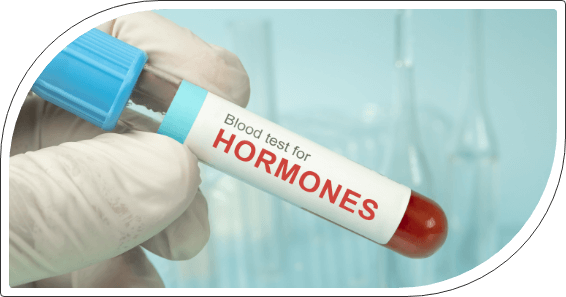Hormone Imbalances
What Is Hormone Imbalances?
A hormonal imbalance is a condition in which the levels of one or more hormones in the body are too high or too low. Hormones are chemical messengers that are produced by glands in the endocrine system. They travel through the bloodstream to the tissues and organs, delivering messages that tell the organs what to do and when to do it.
What are the three most important hormones?

Cortisol:
The stress hormone. "One of the most, or the most important one—especially for anyone with a uterus—is cortisol," said Jardim. ...

Estrogen:
The primary female sex hormone. ...

Melatonin:
The sleep hormone.
What Are The Causes Of Hormonal Imbalances?
Hormonal imbalances can occur for various reasons, and the specific causes can vary depending on the hormone(s) involved and the individual’s unique circumstances. Here are some common causes of hormonal imbalances:
Age and Life Stages:
- Puberty: Hormonal fluctuations during puberty can lead to acne, irregular periods, and mood swings.
- Menopause: In women, the transition to menopause can result in a decline in estrogen and progesterone levels, leading to symptoms like hot flashes and mood changes.
- Andropause: In men, aging can be associated with a gradual decline in testosterone levels, leading to symptoms such as reduced libido and fatigue.
Medical Conditions:
- Polycystic Ovary Syndrome (PCOS): PCOS is a common condition in women characterized by hormonal imbalances, particularly elevated androgens (male hormones), which can lead to irregular periods, acne, and fertility issues.
- Thyroid Disorders: Conditions like hypothyroidism (underactive thyroid) and hyperthyroidism (overactive thyroid) can disrupt the balance of thyroid hormones, affecting metabolism and overall health.
- Diabetes: Both type 1 and type 2 diabetes can lead to insulin imbalances, affecting blood sugar regulation.
- Cushing's Syndrome: This rare condition results from excessive cortisol production, often due to a tumor or prolonged use of corticosteroid medications.
- Adrenal Disorders: Conditions such as Addison's disease can affect the adrenal glands' ability to produce hormones like cortisol and aldosterone.
Stress:
- Chronic stress can lead to elevated levels of stress hormones like cortisol, which can disrupt the balance of other hormones in the body.
Medications:
- Certain medications, including hormonal contraceptives, corticosteroids, and some psychiatric medications, can impact hormone levels.
Diet and Lifestyle Factors:
- Poor diet, lack of exercise, excessive alcohol consumption, and smoking can contribute to hormonal imbalances.
- Obesity can also lead to changes in hormone levels, particularly insulin resistance and imbalances in sex hormones.
Environmental Factors:
- Exposure to endocrine-disrupting chemicals (EDCs) in the environment, such as those found in plastics, pesticides, and certain industrial chemicals, can interfere with hormone function.
Genetics:
- Some individuals may be genetically predisposed to hormonal imbalances or conditions like PCOS or thyroid disorders.
Tumors and Growths:
- Hormone-secreting tumors, such as pituitary adenomas or ovarian cysts, can lead to excess hormone production.
Autoimmune Conditions:
- Autoimmune diseases like Hashimoto's thyroiditis and type 1 diabetes involve the immune system attacking and affecting hormone-producing glands.
Pregnancy and Childbirth:
- Hormonal changes during pregnancy and postpartum can lead to temporary imbalances.
Infections and Illnesses:
- Certain infections and illnesses can disrupt hormone production and function.
Symptoms Of Hormonal Imbalances?
Hormonal imbalances can lead to a wide range of symptoms, and the specific symptoms can vary depending on which hormones are affected and whether the imbalance is due to excess or deficiency of certain hormones. Here are some common symptoms associated with hormonal imbalances:
- Irregular Menstrual Cycles (In Women)
- Mood Changes
- Reduced sex drive (low libido)
- Unexplained weight gain or weight loss
- Skin Problems
- Fatigue and Energy Changes
- Hot Flashes and Night Sweats
- Thyroid-Related Symptoms
- Digestive Issues
- Hair Loss
- Breast Changes
- Bone Health Changes
- Cognitive and Memory Changes
- Muscle Weakness and Aches
- Changes in Blood Sugar and Insulin Regulation
- Infertility and Fertility Issues
- Changes in Blood Pressure
- Changes in Heart Rate
- Excessive Sweating
- Breathing Problems

What are the most common hormone imbalances?
- Estrogen dominance
- Low testosterone.
- Thyroid hormone imbalance.

- Cortisol imbalance.
- Insulin imbalance.
- High testosterone.
Which hormones are commonly imbalanced in men and women?
Can hormone imbalances be prevented?
FAQ's

- How can I tell if I have a hormone imbalance?
- If you suspect a hormone imbalance, it's essential to consult a healthcare professional. They can perform blood tests and other diagnostic evaluations to determine if you have abnormal hormone levels.
- How are hormone imbalances treated?
- Treatment depends on the specific hormone imbalance and its underlying cause. It may involve lifestyle changes, hormone replacement therapy, medications, or surgery in some cases.
- Are hormone imbalances more common in certain age groups?
- Hormone imbalances can occur at any age, but they are more common during significant life transitions, such as puberty, pregnancy, and menopause in women and during aging in both men and women.
- What are the potential complications of untreated hormone imbalances?
- Untreated hormone imbalances can lead to various health issues, including infertility, osteoporosis, cardiovascular disease, mood disorders, and an increased risk of certain cancers.
